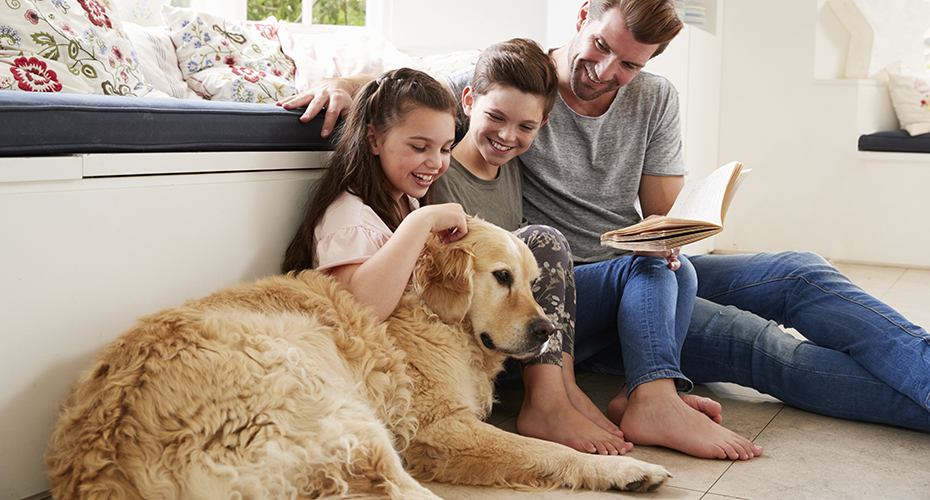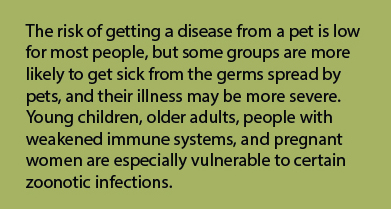4 Tips to Stay Healthy Around Your Pet
Posted on by
Pets, whether covered in fur, feathers, or scales, are an important part of our lives—most American households own at least one pet. Many people see their pet as a member of the family that brings joy and amusement to their life. But did you know that having a pet can even help improve your health? Having a pet can decrease your blood pressure, cholesterol, triglyceride levels, and feelings of loneliness. Pets can also encourage you to be active and get outside, and provide opportunities to socialize.
 While there are many benefits to pet ownership, animals can sometimes carry germs that make us sick. Zoonotic diseases can spread between people and animals—even our pets. In the past decade, we’ve seen outbreaks of illness in people linked to pets such as puppies, rats, hamsters, guinea pigs, turtles, lizards, geckos, hedgehogs, and even water frogs.
While there are many benefits to pet ownership, animals can sometimes carry germs that make us sick. Zoonotic diseases can spread between people and animals—even our pets. In the past decade, we’ve seen outbreaks of illness in people linked to pets such as puppies, rats, hamsters, guinea pigs, turtles, lizards, geckos, hedgehogs, and even water frogs.
You might not realize that the everyday activities involved in caring for your pet can result in the spread of germs from pets to people. Handling pet food and toys, cleaning cages, and yes, even kissing your pet, can pass germs from the pet to you. Pets can spread germs even if they look clean and healthy.
All of this may sound scary, but knowing about zoonotic diseases and the simple things you can do to reduce the risk will help you enjoy your pets and stay healthy. Adopt these four simple habits to help you, your family, and your pets stay healthy and happy.
- Choose the right pet
Not all pets are right for all people. In addition to thinking about the pet’s needs, consider who will be around the pet at home. Are there young kids in the house, or maybe a relative over 65? Certain pets, including reptiles, amphibians, and rodents, are not recommended for children 5 years of age and younger, adults 65 years of age and older, and people with weakened immune systems because they’re more likely to get sick. Rodents and cats can carry diseases that cause birth defects, so think about waiting to adopt one of these pets if you or someone in your home is pregnant. Talk to your veterinarian about choosing the right pet. - Keep your pet healthy
Keeping your pet healthy helps to keep you healthy. Make sure pets get a good diet, fresh water, shelter, and exercise. Regular veterinary care is also important for your pet. Many pets need routine vaccinations, de-worming, and flea and tick control to protect them, and their owners, from certain diseases. Every pet—whether it’s a dog, cat, hamster, ferret, or iguana—should receive life-long veterinary care. If you think your pet might be sick, talk to your veterinarian. Also, remember to include your pets in your emergency preparedness plans so you can keep them safe and healthy in an emergency. - Practice good hygiene
Washing your hands is one of the best ways to stay healthy around pets and can also protect you against other diseases. Always wash your hands after playing with, feeding, or cleaning up after your pet. Pets can contaminate surfaces in your home with germs—you don’t have to touch your pets to get sick from the germs they might be carrying. Keep your pets away from people food and areas where food and drink are prepared, served, consumed, or stored. Always clean up dog feces (poop) from your yard and public areas to prevent the spread of parasites and other germs to people. If you’re pregnant and have a cat, avoid changing the litter box. - Supervise kids around pets
Always supervise young children around pets, even trusted family pets. Children, especially those 5 years of age and younger, can be at higher risk for pet-related illnesses because they often touch surfaces that may be contaminated, put objects in their mouths, and are less likely to wash their hands. Children are often the victims of bites and scratches and are more likely to get seriously ill from certain diseases spread from pets. Don’t let kids kiss pets or put their hands or objects in their mouths after playing with pets. Help them to wash their hands after they interact with any animal.
We all love our pets, but it’s important to know the risks that come with any animal contact, especially for people who are more vulnerable to certain diseases. Practicing healthy pet habits can help you enjoy your pets while staying healthy.
You can learn more about pets on CDC’s Healthy Pets Healthy People website, and be sure to check out this feature for more tips on staying healthy around pets.
Posted on by

